Plot summary
In 1805, Richard Sharpe is to sail to England from India aboard the East Indiaman Calliope to join the 95th Rifles. He is swindled after purchasing supplies for the voyage. After finding out, he gets not only his money back, but also that of fellow victim Royal Navy Captain Joel Chase, saving Chase from the great financial embarrassment of being unable to pay a gambling debt the next day. Chase wants to show his gratitude, but is under orders to destroy a French 74 named the Revenant that is raiding the Indian Ocean.
The Calliope's passengers include the lovely, young Lady Grace Hale and her much older husband, Lord William Hale. Sharpe is also astonished to find aboard Anthony Pohlmann, a renegade and former Maratha warlord (defeated by Arthur Wellesley in Sharpe's Triumph ), traveling under a false identity—Baron von Dornberg—but sees no reason to denounce his former foe.
Peculiar Cromwell, captain of the Calliope, spots the jewels (looted from an Indian ruler) Sharpe has sewn into his clothing and insists that Sharpe leave them with him for safekeeping, to avoid tempting his crew.
Sharpe becomes obsessed with Lady Grace, but his attempts to become better acquainted are unsuccessful, at first. However, she later questions him in private about "Dornberg"; while Cromwell and Dornberg deny knowing each other, she has observed them conversing frequently. Sharpe protects Dornberg as best he can. When Lady Grace gets up to leave, a sudden movement of the ship causes her to stumble, and Sharpe ends up with his arm around her waist. They eventually become secret lovers.
Cromwell leaves the safety of a slow convoy with his fast ship. Lady Grace becomes worried that they are sailing near French-held Mauritius. She ends up spending the first of several nights with Sharpe. Malachi Braithwaite, Lord Hale's secretary, finds out and is angered, as he is attracted to Lady Grace too. Sharpe threatens to kill him if he tells anyone.
The Revenant appears. Before the Calliope is captured, Sharpe hurries to retrieve his jewels from Cromwell's safe, but they are not there. Sharpe suspects both Cromwell and Pohlmann aided the French; both men board the Revenant. A prize crew starts sailing the Calliope to Mauritius. Later, the lieutenant in charge tries to rape Lady Grace; Sharpe goes to her rescue and kills the Frenchman in a swordfight. The other Frenchmen understand and do not punish Sharpe. One day, another ship is spotted. Sharpe manages to cut the tiller ropes controlling the rudder, slowing the Calliope. This enables Captain Chase's Pucelle to capture the Calliope.
Chase invites Sharpe to transfer to his ship; Sharpe is reluctant to accept, until he discovers that Lord Hale has insisted on switching to the faster Pucelle, along with his wife. Chase confides to Sharpe that a French agent, probably Dornberg's "servant", negotiated a secret treaty with the ablest of the Indian Maratha leaders. If it is delivered to Paris, the French might send arms to the Marathas to start a new war against the British.
Chase does everything in his power to overtake the Revenant. Sharpe trains with the marines for shipboard fighting and is introduced to a seven-barreled Nock gun (a weapon which future friend Patrick Harper will favour). A ship is spotted. The Pucelle gives chase, but loses it.
Meanwhile, Lady Grace tells Sharpe that Braithwaite is trying to blackmail her. He ambushes the man. Braithwaite produces a pistol and tries to negotiate, claiming he left a letter describing Sharpe's affair, but Sharpe kills him. When the corpse is found, people assume Braithwaite had a fatal fall.
The Revenant is spotted, and a long chase commences. One night, Lady Grace hesitantly informs Sharpe that she is pregnant with his child, unsure of his reaction. He is delighted.
Then the combined French and Spanish fleets sortie, with Admiral Horatio Nelson's fleet in pursuit. The Revenant joins the enemy fleet, while the Pucelle comes under Nelson's command. When Nelson summons Chase to a meeting, Chase brings Sharpe along and introduces him to his friend the admiral.
When the British attack the enemy fleet, commencing the Battle of Trafalgar, Chase points out the Revenant to Sharpe. Chase sends the Hales to safety, while Sharpe joins the marines. The Pucelle goes to the aid of Nelson's ship, attacking the Neptune, and is attacked in turn by the Revenant. The Revenant is eventually captured. Pohlmann is killed by a cannonball. Sharpe finds the French agent and tosses him into the sea; the man cannot swim. Cromwell survives; Sharpe retrieves his jewels before reluctantly handing him over to Chase.
When Sharpe goes to find Lady Grace, he discovers that she has killed her husband in self-defense. While the battle was raging, Lord Hale had confronted his wife over Braithwaite's letter. He eventually told her that he would kill her and make it appear a suicide. He also promised to sabotage Sharpe's life secretly. Sharpe has a friend take his body up on deck so it will seem that he was killed in the fighting. Upset at first, Lady Grace realises she is now free to do as she pleases.

The Battle of Trafalgar was a naval engagement that took place on 21 October 1805 between the British Royal Navy and the combined fleets of the French and Spanish Navies during the War of the Third Coalition of the Napoleonic Wars (1803–1815).

HMS Bellerophon, known to sailors as the "Billy Ruffian", was a ship of the line of the Royal Navy. A third-rate of 74 guns, she was launched in 1786. Bellerophon served during the French Revolutionary and Napoleonic Wars, mostly on blockades or convoy escort duties. She fought in three fleet actions: the Glorious First of June (1794), the Battle of the Nile (1798) and the Battle of Trafalgar (1805). While the ship was on blockade duty in 1815, Napoleon boarded Bellerophon so he could surrender to the ship's captain, ending 22 years of almost continuous war between Britain and France.
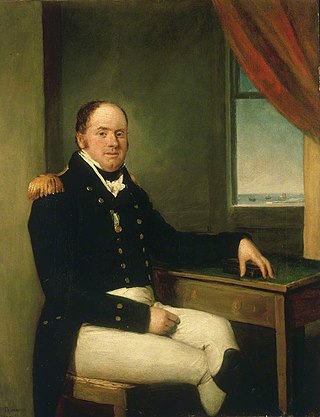
Vice-Admiral Sir Thomas Masterman Hardy, 1st Baronet, GCB was a British Royal Navy officer. He took part in the Battle of Cape St. Vincent in February 1797, the Battle of the Nile in August 1798 and the Battle of Copenhagen in April 1801 during the French Revolutionary Wars. He served as flag captain to Admiral Lord Nelson, and commanded HMS Victory at the Battle of Trafalgar in October 1805 during the Napoleonic Wars. Nelson was shot as he paced the decks with Hardy, and as he lay dying, Nelson's famous remark of "Kiss me, Hardy" was directed at him. Hardy went on to become First Naval Lord in November 1830 and in that capacity refused to become a Member of Parliament and encouraged the introduction of steam warships.
Sharpe is a series of historical fiction stories by Bernard Cornwell centred on the character of English soldier Richard Sharpe. The stories formed the basis for an ITV television series featuring Sean Bean in the title role.

Vice Admiral Cuthbert Collingwood, 1st Baron Collingwood was an admiral of the Royal Navy, notable as a partner with Lord Nelson in several of the British victories of the Napoleonic Wars, and frequently as Nelson's successor in commands.
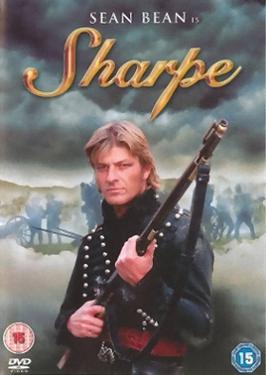
Sharpe is a British television drama series starring Sean Bean as Richard Sharpe, a fictional British soldier in the Napoleonic Wars, with Irish actor Daragh O'Malley playing his second in command, Patrick Harper. Sharpe and Harper are the heroes of the Sharpe series of novels by Bernard Cornwell; most, though not all, of the episodes are based on the books. Produced by Celtic Films and Picture Palace Films for the ITV network, the series was filmed mainly in Crimea, with recordings of other episodes in Turkey, England, Portugal and Spain. The two final episodes were filmed in Jaipur, India.

HMS Agamemnon was a 64-gun third-rate ship of the line of the British Royal Navy. She saw service in the American Revolutionary War, French Revolutionary, and Napoleonic Wars and fought in many major naval battles. She is remembered as Horatio Nelson's favourite ship, and she was named after the mythical ancient Greek king Agamemnon, the first ship of the Royal Navy to bear the name.

HMS Neptune was a 98-gun second-rate ship of the line of the Royal Navy. She served on a number of stations during the French Revolutionary and Napoleonic Wars and was present at the Battle of Trafalgar in 1805.
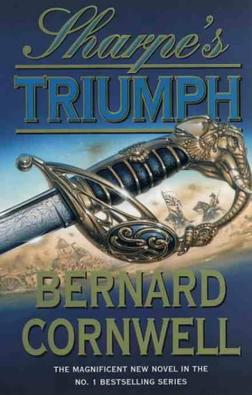
Sharpe's Triumph is the second historical novel in the Richard Sharpe series by Bernard Cornwell, first published in 1998. Sharpe is a sergeant in the army who attracts the attention of General Arthur Wellesley at Ahmednagar.

Sharpe's Prey is the fifth historical novel in the Richard Sharpe series by Bernard Cornwell, first published in 2001. The story is set in 1807 during the Napoleonic Wars.

The Battle of Cape Ortegal was the final action of the Trafalgar campaign, and was fought between a squadron of the Royal Navy and a remnant of the fleet that had been defeated earlier at the Battle of Trafalgar. It took place on 4 November 1805 off Cape Ortegal, in north-west Spain and saw Captain Sir Richard Strachan defeat and capture a French squadron under Rear-Admiral Pierre Dumanoir le Pelley. It is sometimes referred to as Strachan's Action.
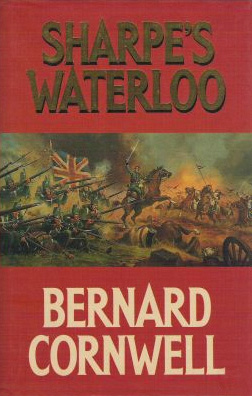
Sharpe's Waterloo is a historical novel in the Richard Sharpe series by Bernard Cornwell. Originally published in 1990 under the title Waterloo, it is the eleventh novel of the Sharpe series and the twentieth novel in chronological order. Cornwell stated that he intended to end the series here, but later changed his mind.
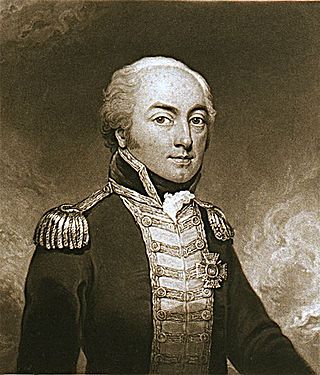
Rear-Admiral Sir George Johnstone Hope, KCB, KSO was a British naval officer, who served with distinction in the Royal Navy throughout the French Revolutionary and Napoleonic Wars, including service at the Battle of Trafalgar. A close personal friend of Admiral Nelson, he received many honours following the battle, and later served as a Lord of the Admiralty.

Sharpe's Enemy: Richard Sharpe and the Defence of Portugal, Christmas 1812 is the fifteenth historical novel in the Richard Sharpe series by Bernard Cornwell, first published in 1984. The story is set in 1812 during the Napoleonic Wars.
Anthony Pohlmann was a Hanoverian soldier who served in the armies of the British East India Company and Gwalior State.
William Prowse CB was an officer of the Royal Navy, who saw service during the American War of Independence, and the French Revolutionary and Napoleonic Wars. Rising from humble origins and joining the navy as an able seaman, he had a highly active career, serving under some of the most famous naval commanders of the age of sail, and participating in some of their greatest victories. He was at Grenada and Martinique under Byron and Rodney, the Glorious First of June under Howe; and commanded ships at Cape St Vincent under Jervis, Cape Finisterre under Calder and Trafalgar under Nelson. He finished his career by serving with distinction in the Mediterranean, and died with the rank of Rear-Admiral.
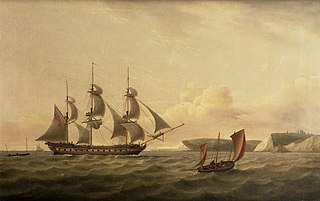
HMS Amazon was a 38-gun fifth-rate Amazon-class frigate of the Royal Navy. She served during the French Revolutionary and Napoleonic Wars under several notable naval commanders and played a key role in the Battle of Copenhagen under Edward Riou, who commanded the frigate squadron during the attack. After Riou was killed during the battle, command briefly devolved to John Quilliam. Quilliam made a significant impression on Horatio Nelson, who appointed Quilliam to serve on the flagship HMS Victory. Amazon passed to William Parker, who continued the association with Nelson with service in the Mediterranean and participation in the chase to the West Indies during the Trafalgar Campaign. Amazon went on to join Sir John Borlase Warren's squadron in the Atlantic and took part in the defeat of Charles-Alexandre Léon Durand Linois's forces at the action of 13 March 1806. During the battle, she hunted down and captured the 40-gun frigate Belle Poule.
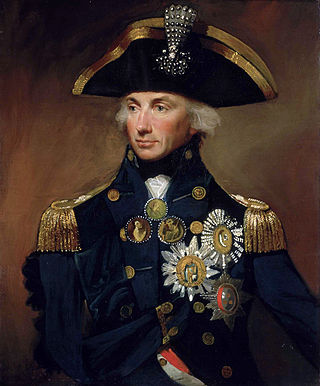
Vice-Admiral Horatio Nelson, 1st Viscount Nelson, 1st Duke of Bronte was a British flag officer in the Royal Navy. His inspirational leadership, grasp of strategy and unconventional tactics brought about a number of decisive British naval victories during the French Revolutionary and Napoleonic Wars. He is widely regarded as one of the greatest naval commanders in British history.















